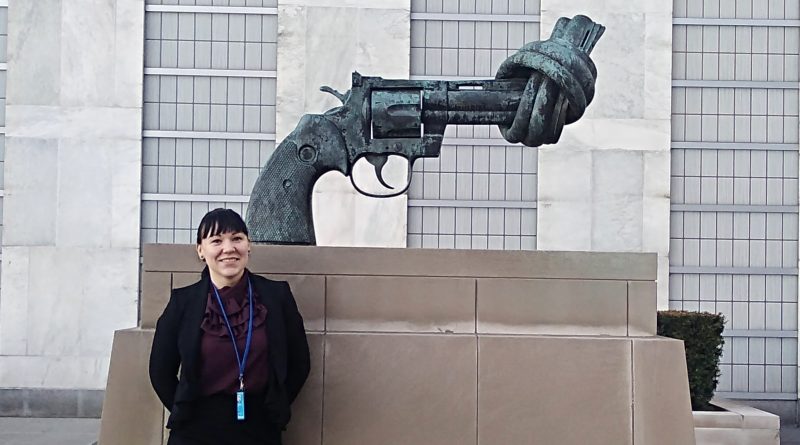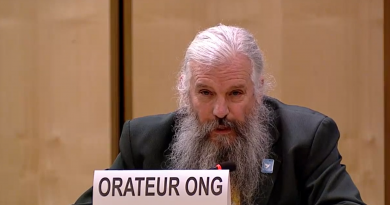CGNK calls for gender-responsive policies at UN
The annual Commission on the Status of Women met for the 63th time in United Nations’ HQ in New York from 11th to 22nd of March 2019. This year’s priority theme concentrated on social protection systems, access to public services and sustainable infrastructure for gender equality and the empowerment of women and girls. Elina Viitasaari, Gender Focal Point at Center for Global Nonkilling, participated on this high-level event and submitted a written statement by CGNK to CSW63. The statement can be downloaded in the UN document system under signature E/CN.6/2019/NGO/18 (also see below).
In 2019, women still face violence due to the dark lightning on public spaces that increases the sexual harassment and assaults, and due to the lack of piped clean water that leads for rapes on water collecting trips. Millions of girls are out of school, and millions of women are without birth certificate or identity card – both putting women in high risk of discrimination and killing. Informal work often deprives women from any access to work protection benefits like maternity leave, work safety or pension, increasing the likelihood of abuse and violence. Over 200 million women still need modern contraceptives, putting them in danger of unplanned pregnancies and unsafe abortions, STDs, and preventable maternal deaths.
All these and many other challenges that women and girls face on their everyday life could be solved through gender-responsive budgeting on infrastructure, public services, and social protection. CGNK’s statement focused specifically on breaking the patriarchal structures that are kept up through unequal social protection services. By including gender-responsive factors in governments’ social protection and violence prevention programs they empower women in participating decision-making and politics; building a career and ensuring an education; attaining work safety; and, having equal access to health services. These key points were those that the Center for Global Nonkilling emphasized during its participation on CSW63.
Statement to CSW63
Gender inequality in any sector is a clear threat for women’s and girls’ well-being everywhere. Barriers on accessing public services and discriminations under social protection systems are decreasing women’s possibilities for safe and valuable lives, undermining the path set by the Global Goals, and particularly targets related to the elimination of violence against women and girls (5.2, 5.3, 16.1 and 16.2). These barriers not only create a psychological, social and economic stress for women, but can lead to killing.
The Center for Global Nonkilling has argued in previous statements (E/CN.6/2015/NGO/21, E/CN.6/2016/NGO/7 and E/CN.6/2018/NGO/8) how the Sustainable Development Goals present an opportunity for collectively addressing risk and protective factors that can combined to prevent and decrease violence against women. The development of these protective factors and the reduction of associated risk facts usually falls within the scope of social protection systems.
The eradication of poverty through appropriate social protection systems, the achievement of universal health coverage and addressing mental health and substance abuse, the access to quality early childhood development and nonviolent learning environments, the development of social protection policies that achieve greater equality and inclusion and ensuring access to safe housing and basic services as part of inclusive urbanization, are instrumental to reducing violence and must include a sharp gender-responsive approach.
Gender-responsive social protection should be created together with women. Without women on a decision-making levels, the policies may on their best become gender-sensitive yet not-responsive. Women often suffer from the consequences of unequal social protection, which is why they recognize the problems and pitfalls of these policies, particularly in violence-ridden communities. Only with the active involvement of women, will these issues and perspectives be brought into discussion, giving governments both chance and pressure to change toward social protection policies more suitable and effective for all genders.
Social protection systems are built to prevent, manage, and overcome situations that adversely affect people’s well-being, but very often fail to address violence and its risk and protective factors as a major social problem. This was acknowledged by the World Health Assembly in its 2014 Resolution on Strengthening the role of the health system in addressing violence, in particular against women and girls and against children (WHA67/2014/REC/1). By reducing poverty and vulnerability, by creating a safety net for people when they face economic or social risks, and by providing basic services in health, education and housing, social protection is also a powerful tool to prevent violence.
But to be effective, such systems should be equal to all. Yet they often fail to notice concrete needs that women have. Women face poverty more than men and women are more often than men in vulnerable positions due to the conflicts or gender inequality issues, leading them to vulnerable positions because of inefficient social protection system. These situations must be bluntly acknowledged as part of the structural violence against women.
Addressing gender inequality and promoting women’s empowerment through the provision of social protection is a basic human rights issue. While the world has become more globalized, women’s poverty, oppression and exploitation have all increased. Gender-responsive social protection can address the challenge of the structural violence that women and girls are exposed to. Patriarchy sustains structural, physical and psychological violence by maintaining gender inequalities but can also be curtailed through gender-responsive social protection. Some effective policies that require gender-specific resolutions are women’s participation in politics and decision making, education and career support, work safety, and health programs. Evidence-based interventions that focus on challenging social norms and attitudes that sustain patriarchal values and legitimize violence against women and girls have also been tested.
Although globally most victims and perpetrators of lethal violence are men, women and girls are severely affected by other forms of violence. One in three women worldwide has suffered sexual violence by an intimate partner, and out of these 40–50 per cent of women have experienced sexual advances, physical contact or other forms of sexual harassment at work. In addition, a raising number of women who have reported or complained about the harassment have experienced victimization.
Social protection must address this reality by providing judicial advice and help when filing a formal report or complain at home, work, or other settings, and by offering health support to care for physical and psychological traumas caused by violence. Social protection must also develop a strong social sensitization component to take sexual harassment and other forms of violence against women seriously and by emphasizing the importance of accountability (i.e., the global #MeToo campaign). Social protection must also provide women a way out of abusive relationships by providing safe places to live and recover or build financial independence and nurture their children, while also investing in girls’ education will double their eventual earnings, end child marriage, decrease fertility rates, enhance women’s bargaining power in the household and overall strengthen institutions. In many countries, women still face a systematic denial of information and services of sexual and reproductive health, such as affordable access to modern methods of contraception. Unfortunately, this leads to unplanned pregnancies, unsafe abortions, unnecessary and preventable maternal deaths and to sexually transmitted diseases such as HIV/AIDS. Thus, lives and health of women are put in risk as they are those who need to carry the consequences of these policies, even though the same rules apply to men. Social protection has a good chance on preventing these health issues, preventing unnecessary human suffering and public expenditure. In addition, when social protection is accessible and affordable for all, it can ensure critical health services especially to poor women, who are easily dropped out of the health care system due to financial issues.
By including gender-responsive factors in their social protection, governments can make significant differences in addressing violence against women and girls, but also encourage women’s participation in decision-making and improving living conditions in many countries. Empowering women through social protection does not affect women themselves but also the general population through positive effects and impacts on families, communities and societies at large. Gender equality is the key to unlocking many positive developmental results including the significant reduction of homicide and other forms of violence everywhere and is crucially required to achieve the Sustainable Developmental Goals as a whole. For gender equality to be attained, there is a pressing need for the provision of social protection services that have the potential to empower women and prevent violence.
Considering the importance of early childhood development for preventing violence, social protection can engage in long term change by supporting both maternal and paternal paid leaves giving everyone an equal opportunity for starting a family despite one’s economic or social situation. Often, it is women who carry out most domestic work having significantly more unpaid work hours than men. Women are also spending more time taking care of the children and elder, which is often not socially valued and does not allow for social benefits in later life. Too often this is a burden that women carry while trying to work outside the home, creating negative dependence situations that in cases provide no options to escape from situations of violence. Social protection can play an enormous role in supporting women accessing or reintegrating back to work, gaining financial independence, as well as encouraging men to share their part of raising a family.
The Center for Global Nonkilling encourages all member states and the United Nations system, together with national and local governments to clearly include gender-responsive factors in their budgeting of social protection and violence prevention programs and institutions in order to empower women in participating decision-making and politics; building a career and ensuring an education; attaining work safety; and, having equal access to health services. There are still several inequalities in all these factors, preventing women to live their lives on full potential and health. These social protection initiatives provide opportunities to promote gender equality, fight patriarchy and address historical imbalances that keep women oppressed.




